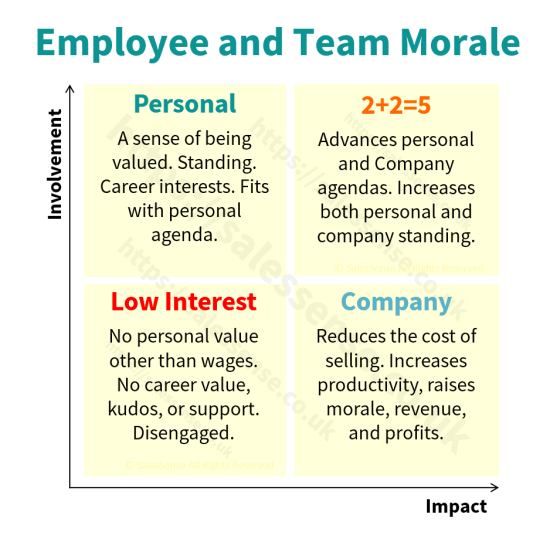How to connect what you sell with improved morale.

What is morale? If you have improved morale, you know it. You feel confident about your current circumstances or work.
While difficult to quantify, there is a definite correlation between improved morale and performance. And when the opposite is true, performance suffers.
The signs of low morale in a team include:
- Poor communication with management
- Communication failure within teams
- Excessive complaints about small things
- Increased conflicts among staff
- Increased customer complaints
- Frequent absenteeism
- Poor work quality
Paying attention to staff development has a measurable impact on how people feel about their work and how they perform.
How does what you sell, affect the morale of your customers and their staff?
Does it help people do a better job?
Do people get more job satisfaction from its use?
Can people get better results using what you sell?
How do these things increase morale?
Add an IMPROVED MORALE section to the table that you started.
How does what you sell lead to improved morale? Share your conclusions in the comments or send it to me for feedback: clive@salessense.co.uk
Free B2B Sales Training Course Index
Can you learn for yourself?
Learning for oneself is an essential skill that can be cultivated through intentional practices. Here are some strategies to help people learn effectively on their own:
1. Set Clear Goals
Identify Objectives: Start by defining what you want to learn and why. Clear goals provide direction and motivation. Divide larger objectives into smaller, manageable tasks. This makes the learning process less overwhelming and more achievable.
2. Create a Learning Plan
Outline a Roadmap: Plan out the steps and resources you’ll need. A structured approach helps you stay organized and on track. Dedicate specific times for learning. Consistency is key to building knowledge and skills over time.
3. Leverage Quality Resources
Curate Information: Seek out high-quality books, courses, articles, and videos relevant to your goals. Not all sources are equal, so prioritize reputable ones. Combine different mediums like reading, watching, and hands-on practice to reinforce learning.
4. Engage in Active Learning
Take Notes: Writing things down helps reinforce what you learn and provides a reference for later.
Ask Questions: Challenge yourself with questions that test your understanding. This promotes deeper engagement with the material. Explaining concepts to someone else is one of the best ways to solidify your understanding.
5. Practice Regularly
Apply What You Learn: Regular practice is crucial for skill development. Whether it’s coding, writing, or playing an instrument, consistent practice builds proficiency. Don’t be afraid to try new things or make mistakes. Experimentation leads to discovery and deeper understanding.
6. Reflect on Progress
Review Regularly: Periodically revisit what you’ve learned to reinforce retention and identify areas for improvement.
Adjust Your Approach: If something isn’t working, tweak your methods or resources. Flexibility is important in the learning process.
7. Cultivate a Growth Mindset
Embrace Challenges: View difficulties as opportunities to grow rather than obstacles. Persist through setbacks, Learning is often a process of trial and error. Resilience in the face of setbacks is key to long-term success.
8. Join a Community
Find Like-Minded Learners: Engaging with a community of people who share your interests can provide support, motivation, and new perspectives. Participate in discussions, online forums, study groups, or local meetups for valuable interaction and feedback.
9. Stay Curious
Explore Beyond the Curriculum: Don’t limit yourself to a set path. Allow your curiosity to guide you to new areas of interest. Ask why and how. Continuously question the material to gain a deeper understanding and foster a more inquisitive mindset.
10. Monitor Well-Being
Balance Learning with Rest: Ensure that you’re not overloading yourself. Breaks and relaxation are essential for maintaining productivity and mental health. Keep your enthusiasm alive by setting rewards for milestones and celebrating small victories.
By incorporating these strategies, individuals can take control of their learning journey and develop the skills needed to succeed independently.
Have us help you achieve learning momentum. Join our new scheduled one-hour-a-week professional sales career training course.
If you have the discipline of an autodidact, use our self-led B2B sales training course. See the index here. This page presents 2.35, about quantifying the improved morale value of what you sell. If you need more, have any of our B2B sales training courses or any element or combination of elements delivered for groups or individuals through online sales training sessions or one-to-one coaching. Call +44 (0)1392 851500 or email jimm@salessense.co.uk for details.












